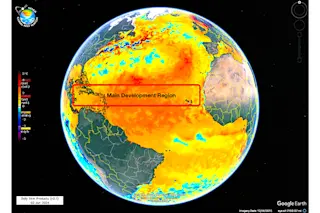Chalk up another unexpected consequence of pumping too much carbon dioxide into the air: According to a new study, the excess CO2 that ends up in seawater is gradually making the oceans noisier. The changing chemistry of the ocean is one of the major impacts of CO2 emissions. The dissolved gas is changing the pH of the water by making it more acidic, which makes life harder for corals and marine critters with calcium carbonate shells that are corroded by the acidic water. But the new study, published in Nature Geoscience, found that changing the pH of the oceans also reduces the levels of chemicals that absorb sound, like magnesium sulphate and boric acid.
Low-frequency sound in the ocean is produced by natural phenomena such as rain, waves and marine life, and by human activities such as sonar systems, shipping and construction. The sound is absorbed mainly through the viscosity ...














